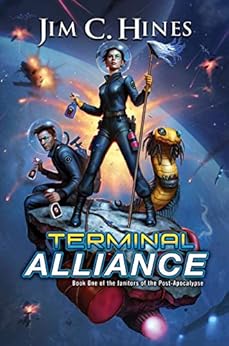A Pale Light in the Black is, unfortunately, not science fiction. It's not even a space opera. It's a sports novel in space.
For the past year, their close loss in the annual Boarding Games has haunted Interceptor Team: Zuma’s Ghost. With this year’s competition looming, they’re looking forward to some payback—until an unexpected personnel change leaves them reeling.And Someone is targeting members of Zuma’s Ghost, a mysterious opponent willing to kill to safeguard a secret that could shake society to its core . . . a secret that could lead to their deaths and kill thousands more unless Max and her new team stop them. Rescue those in danger, find the bad guys, win the Games. It’s all in a day’s work at the NeoG.
Based on the description, I expected a story balanced between preparing for the big competition and uncovering the secret conflict, but that wasn't the case. While there were bits of an investigation scattered throughout the book, at least 80% of the story focused on competition and the celebrity it brought the characters. Maybe 10% of the story was about the characters' family issues and mere 10% about investigating the mystery eventually revealed threat
I've never liked sports and don't enjoy reading about sports celebrities. So I ended up skimming through the last third of the book.
When the final conflict came, it was a bit of a let down. The villain was too easily caught. There was never any real tension or question about who would prevail.
So, only read this book if you're a sports fan.



